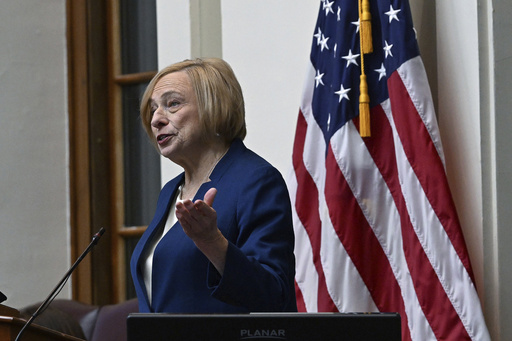
On Friday, President Donald Trump engaged in a heated exchange with Maine’s Democratic Governor Janet Mills during a gathering of governors at the White House. The confrontation arose from Trump’s efforts to withhold federal funding from the state, connected to his stance on transgender athletes participating in girls’ and women’s sports. Mills firmly stated, “We’ll see you in court,” indicating her readiness to challenge his administration’s decision in a legal setting.
Trump, in response, expressed his eagerness for such a court case and suggested that opposing his directive could jeopardize Mills’ political future. This dispute followed a series of sharp comments exchanged between the two parties over the preceding day regarding the president’s attempts to impose restrictions on transgender athletes. The tense dialogue was notably atypical for a White House event, where governors from various parties usually interact with courtesy and respect.
The incident occurred during Trump’s remarks aimed at welcoming the nation’s governors. He specifically sought out Mills while discussing an executive order he had signed regarding transgender athletes, having previously mentioned her at a Republican Governors Association event. When Trump questioned her willingness to comply with his order, Mills asserted, “I’m complying with state and federal laws.” Trump retorted, asserting that “We are the federal law,” and warned that the state could face consequences such as a loss of federal funding.
Mills reiterated her commitment to follow laws, to which Trump ominously warned that continued non-compliance could result in sanctions against the state’s federal assistance. The governor stood firm, stating, “We’ll see you in court,” to which Trump replied, “I look forward to that,” and implied that Mills’ career in elected office could be nearing its end.
Earlier that week, Trump had hinted at similar actions, expressing his belief that transgender boys were competing in Maine, and declared that federal funding would be contingent upon the state addressing what he viewed as non-compliance. This claim coincides with the decision made by the Maine Principals’ Association, which oversees high school sports, to allow transgender female athletes continued competition based on the Maine Human Rights Act, which prohibits discrimination due to gender identity.
Following Trump’s remarks, Mills and Maine’s Democratic attorney general emphasized their determination to resist any potential intimidation. Mills stated that her administration, along with the attorney general, would pursue all necessary legal avenues to safeguard federal funding and ensure students’ access to it. Attorney General Aaron Frey vowed to defend Maine’s laws against what he termed as the president’s bullying tactics.
The executive order signed by Trump earlier in the month grants federal agencies the discretion to ensure that organizations receiving federal aid adhere to Title IX, based on the administration’s interpretation that “sex” refers to the gender someone was assigned at birth.
This encounter highlights the ongoing national debate surrounding transgender rights and state versus federal authority, as well as the potential political implications for those involved.

